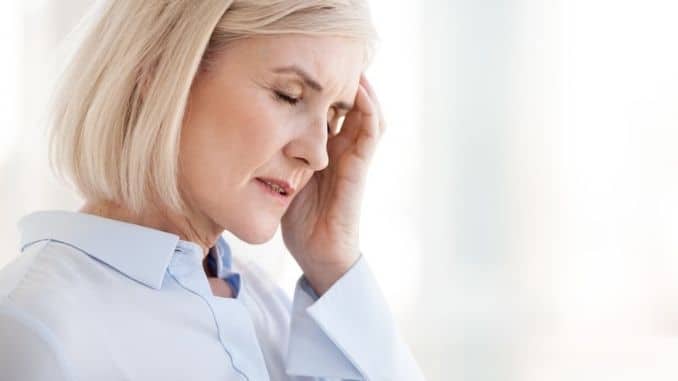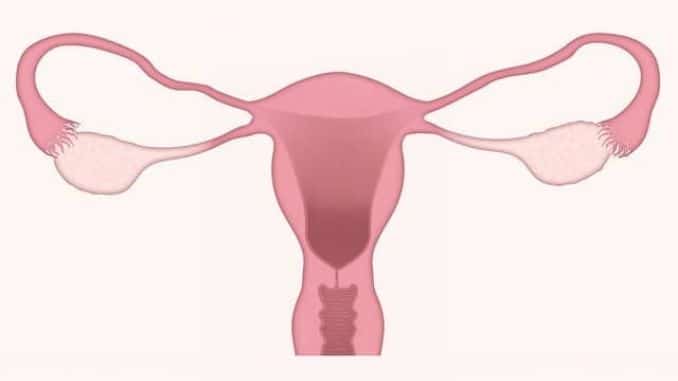
Menopause is a perfectly natural occurrence, but it can create difficult and even disruptive symptoms that can interfere with a woman’s daily life. In one study, 86 percent of women consulted with a doctor at least once to discuss menopausal symptoms while going through this transitional period.
You may be experiencing some common menopausal symptoms now or perhaps you’re feeling some other strange symptoms you’re not sure are connected to menopause.
Below, we give you more information on five common and five less common symptoms of menopause, along with helpful tips to soothe them all.
What Is Menopause?
Menopause is one of those words with a few different meanings. The official definition is that point in time 12 months after a woman’s last period. Once that occurs, a woman’s menstrual cycles are said to have stopped permanently, ending her reproductive years.
However, there is the period leading up to that official point, which many women also refer to as “going through menopause.” Doctors are more likely to call it “perimenopause” or “the menopausal transition.”
Unfortunately, menopause doesn’t happen all at once. It might be easier if it did so we could be done with it. However, the transition period can go on for months or even years.
During that time, the ovaries — egg-storing glands that produce the female reproductive hormones estrogen and progesterone — begin to slow down. This causes the levels of female hormones in the body to vary greatly. The ovaries stop releasing eggs into the fallopian tubes and hormone production drops.
Over the crux of the transition, the overall production of estrogen and progesterone falls significantly. Once the ovaries are no longer releasing any eggs at all, the woman has reached official menopause as she no longer has menstrual periods. Levels of her reproductive hormones reach a new low by this time.
The whole process typically starts in the 40s or early 50s. Perimenopause — the transition period — can begin eight to 10 years before official menopause, although it usually lasts about four years or so. For some women, it may last only a few months. In the last two years of perimenopause, estrogen levels drop more severely, and women are likely to experience menopause symptoms.
Postmenopause is the period after menopause, when symptoms usually ease up, although some women continue to struggle with them for a while. Because of lower levels of estrogen, which is a protective hormone, postmenopausal women become more at risk for health conditions like heart disease and osteoporosis and must take steps to protect themselves.
5 Typical Symptoms of Menopause
Below are common or typical symptoms likely to occur during perimenopause. Drops in levels of estrogen and progesterone are believed to cause them.
1. Hot Flashes
This is the most well-known and, for many women, the most difficult symptom of menopause. A hot flash feels like a sudden swell of warmth or intense heat that spreads over the body, causing sweating and flushing in the face and, sometimes, skin redness. If it happens in the middle of the night, it’s called “night sweats” and can wake you up out of the blue.
Other symptoms that often accompany a hot flash include:
- Rapid heartbeat
- Anxiety
- Nausea
- Dizziness
- Headache
- Weakness
- A feeling of suffocation
- Sleep problems
When it’s over, you may find that you have soaked your clothes with sweat. In the case of a mild hot flash, you may have only a sheen of perspiration on your skin. For some women, a hot flash can feel like a panic attack or heart attack, so it’s important to be aware of the symptoms.
Doctors believe hot flashes are related to dropping levels of estrogen, but they don’t know exactly how this results in the brain turning up the heat.
Helpful tips: Talk to your doctor about hormone therapy — it’s not as risky as was once believed and is the most effective treatment for hot flashes. Some nonhormonal medications, including antidepressants, drugs prescribed for nerve pain and high blood pressure medications, may also help.
Avoid potential hot flash triggers like alcohol and caffeine, hot foods, hot weather, hot tubs, and saunas and smoking. Practice a daily stress-relieving activity and dress in layers.
2. Vaginal Dryness and Bladder Control Issues
Another common symptom of menopause, vaginal dryness can make sex uncomfortable or even painful. It can also cause pain during exercise or urination. It’s a sign that the vaginal tissues have become thinner and more easily irritated — a result of dropping estrogen levels.
Hormonal changes can also affect the bladder, thinning the tissues and creating more urgency and sometimes increasing bladder infections. Pelvic muscles surrounding the bladder that typically support it can also weaken with menopause and aging, resulting in an increased risk for urinary incontinence.
Helpful tips: Ask your doctor about hormonal creams, tablets, and rings that can reinvigorate vaginal tissues. Because these are topically applied, they carry an even lower risk of potential side effects than regular hormone therapy. Use vaginal lubricants during sexual activity and apply vaginal moisturizers regularly to keep vaginal tissues healthy.
For urinary issues, try strengthening the pelvic muscles with Kegel exercises ― squeeze as if temporarily stopping the urine stream, hold the squeeze five to 10 seconds, let go and then repeat. Keep up on personal hygiene and drink water regularly to help avoid infections. Try discreet liners and pads as needed.
3. Mood Swings
Typical and Unusual Symptoms of Menopause: Studies indicate that about a quarter of women going through perimenopause experience mood swings and related symptoms like depression, irritability, and anxiety. Hormone fluctuations along with disrupted sleep can cause them to can uncertain feelings about body image, an end to fertility and aging in general.
Helpful tips: If you’re experiencing symptoms of depression ― sadness, lack of energy and apathy, for example ― talk to your doctor about therapy or antidepressants. Regular exercise can also help as can wellness practices like yoga, tai chi, and meditation. For those struggling to find a new purpose in life at a later stage, trying new things can restore a more positive mood.
4. Thinning Hair and Dryer Skin
Unfortunately, along with all the other symptoms women must deal with are those that seem to attack appearance. Because of hormonal changes, most women will find that their skin is dryer than it used to be, and that fine lines, wrinkles, and sagging are more noticeable. The hair becomes dryer and, for some women, begins to thin.
As estrogen and progesterone levels drop, male hormones can increase, causing hair follicles to shrink, which can lead to hair loss. These same hormones can also cause hair to show up where you don’t want it, such as on the chin and upper lip.
Helpful tips for hair: If you’re suffering from hair loss, consider a shorter haircut, which will add volume and can help hide problem spots. You can also try topical hair growth products, surgical hair transplants, laser scalp treatments, and hair extensions. Use a mild, moisturizing shampoo free of chemicals and treat your hair gently. Avoid tightly wound styles and don’t comb or brush when wet. Limit the use of heated styling tools and use a deep, restorative conditioner more often.
Helpful tips for skin: Use gentle cleansers to avoid stripping the skin of its natural oils, then apply moisturizer directly after cleansing. Look for ingredients like retinol to help slow down the appearance of aging and vitamin C to protect skin and fade dark spots. Use moisturizers with natural oils and butter for better moisturization.
5. Weight Gain
Typical and Unusual Symptoms of Menopause: This is one of the most frustrating changes women go through during perimenopause and afterward. Women often feel like they haven’t changed their daily habits, yet the pounds keep stacking up.
Hormonal changes do make it more likely that you’ll gain weight around your abdomen, and that’s the more dangerous type when it comes to overall health. Other changes that typically accompany aging can also make it harder to maintain your figure, including:
- Loss of muscle mass
- Lack of physical activity (or “enough” exercise)
- Genetic factors
- Sleep problems
Helpful tips: Make a point to extend your daily workout times. If you’re currently exercising 30 minutes a day, bump that up to 45 or 60 minutes. It doesn’t have to be all at once — find more ways to fit in movement throughout your day, such as a walk during your lunch hour or after dinner.
It can also help to add in a strength-training workout to your weekly routine. Building your muscle back up can help make it easier for you to lose weight or maintain the weight you have.
Try to cut back on the calories you consume every day. Even if you haven’t increased them, with age, it’s often necessary to cut back to maintain a healthy weight. Find little ways to eliminate calories — snack on veggies instead of sugary treats, for example, or choose water to drink rather than soda or juice.
Finally, address any sleep problems you may be having. Lack of sleep is a large factor in increasing appetite.
5 More Unusual Menopausal Symptoms
In addition to the common symptoms listed above, some women also experience more unusual symptoms like the following when going through menopause.
1. Burning Mouth or Burning Tongue
Typical and Unusual Symptoms of Menopause: This can affect the mouth and/or on the tongue, causing burning, stinging and tingling as if you just ate or drank something hot even when you didn’t. It may be accompanied by numbness, dryness and a metallic taste.
Helpful tips: Avoid spicy foods and strong mint flavors. Alleviate symptoms with cold or iced water and help prevent them by chewing gum. Over-the-counter moisturizing mouth sprays may also help.
2. Painful Heels
Heel pain becomes more common in menopausal women than in women who haven’t yet reached menopause. It’s most commonly caused by plantar fasciitis — a condition in which the band of tissue that extends along the bottom of the foot becomes inflamed. Changes in hormone levels can also thin the fat layer that cushions the sole, leading to pain.
Helpful tips: Wear more supportive shoes and avoid heels. Apply ice to reduce swelling and pain. Talk to your podiatrist about orthotics. Rest the foot as needed — switch from running to biking, for example, until the area heals. Start stretching your calves more often.
3. Breast Pain
Typical and Unusual Symptoms of Menopause: Before and during menopause, changing hormone levels can lead to pain and tenderness in the breasts. It may feel like a dull ache or a burning, throbbing pain.
Helpful tips: Always wear a supportive bra. Try a heating pad to reduce pain and use over-the-counter pain relievers. Drink more water as dehydration can worsen breast pain. Some women find that yoga helps too. Potentially helpful supplements include evening primrose oil and fish oil.
4. Digestive Problems
Typical and Unusual Symptoms of Menopause: For many women, bloating, indigestion, acid reflux, constipation, and diarrhea become more common during perimenopause and menopause. With age, digestion also tends to slow down, which can make the problem worse.
Helpful tips: Exercise regularly and drink enough water to help keep things moving through the intestinal tract. Avoid trigger foods that produce gas and bloating like beans, broccoli, fatty foods, fried foods, and carbonated beverages. Eat smaller meals in general and eat more probiotic-rich foods like yogurt, kefir, kombucha, and sauerkraut. Try digestive enzyme supplements taking during or before meals to reduce post-meal bloating and indigestion.
5. Changes in Body Odor
Typical and Unusual Symptoms of Menopause: If you find that you’re battling body odor more often, it could be a sign of perimenopause. For many women, hormonal changes result in changes in how the body smells. This may be because of hot flashes and night sweats as well as anxiety-stimulated stress.
Helpful tips: Include more foods that are rich in odor-busting zinc and magnesium like shellfish, broccoli, pecans, cashews and tofu. Consider adding wheatgrass to your smoothies as it contains chlorophyll — nature’s natural deodorant. Limit intake of odor-producing foods like deep-fried and sugary items. Reduce stress as much as you can, stay hydrated and choose more breathable fabrics to wear.
For your guide to the best foods to heal your body, make sure to check out The Best Foods that Rapidly Slim & Heal in 7 Days, here!
.







